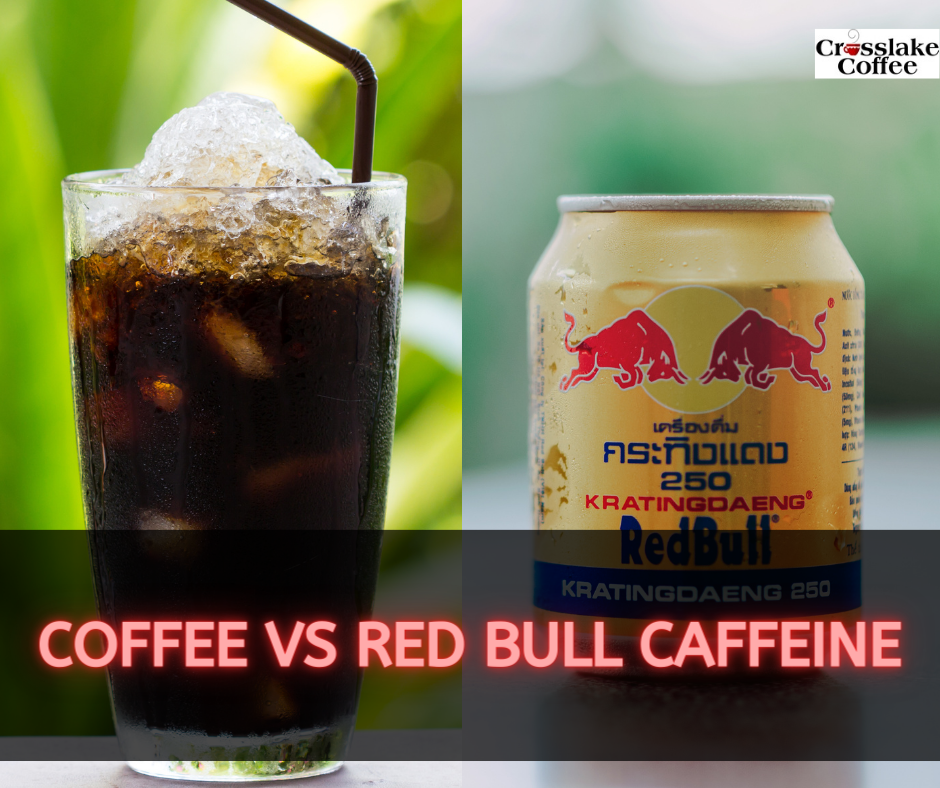Coffee Vs Red Bull Caffeine: Buzz Battle Breakdown
A typical cup of coffee contains more caffeine than a can of Red Bull. While an 8 oz cup of coffee usually has about 95 mg of caffeine, an 8.4 oz can of Red Bull contains about 80 mg.
Exploring the world of caffeinated drinks often leads to comparing coffee with energy drinks like Red Bull. Both have their loyal followings and provide that much-desired energy boost. Coffee has been a staple for centuries, admired for its rich flavor and various brewing methods.
On the other hand, Red Bull is a newer addition, known for its quick, convenient energy and association with extreme sports and nightlife. Caffeine content is a major point of comparison, as it significantly influences the effects these beverages have on our bodies and minds. Whether you’re pulling an all-nighter, kick-starting your morning, or fueling an adrenaline-packed activity, choosing between coffee and Red Bull can depend on personal taste preferences, your desired caffeine intake, and how quickly you want the caffeine to take effect.
Caffeine Showdown: Coffee Vs. Red Bull
Coffee and Red Bull offer different caffeine experiences. A regular 8 oz cup of coffee has about 95 mg of caffeine. This varies based on the coffee blend. Red Bull provides a quick energy surge with 80 mg of caffeine in an 8.4 oz can. People seeking long-lasting focus often choose coffee. Those needing instant pep opt for Red Bull.
What’s In Your Cup?
Coffee comes from roasted coffee beans. These beans are seeds from coffee plants. The amount of caffeine in your cup can vary. It depends on the type of coffee bean, roast level, and preparation. A typical 8-ounce brewed coffee can have about 95 milligrams of caffeine.
Red Bull is an energy drink with a specific formula. It mixes caffeine, taurine, sugars, and B-vitamins. A single 8.4-ounce can of Red Bull has about 80 milligrams of caffeine. It has added ingredients designed to boost energy levels.
Health Implications And Side Effects
Caffeine affects the body differently, depending on its source. While both Coffee and Red Bull provide a caffeine boost, their additional ingredients vary and influence health outcomes. Coffee offers antioxidants but can also lead to stomach issues or acid reflux in some individuals. On the other hand, Red Bull contains tuarine and B-vitamins which might give a quicker energy surge but can lead to increased blood pressure and heart rate. Excessive consumption of either can result in insomnia, nervousness, restlessness, and even palpitations.
People sensitive to caffeine should approach both drinks with caution. Daily consumption should not exceed recommended amounts: about 400 milligrams for healthy adults. This equates to roughly four cups of coffee or five 8.4 oz cans of Red Bull. Track intake to avoid negative side effects and choose options that align with personal health needs.
Taste, Experience, And Culture
Coffee boasts a rich tapestry of tastes from bitter to sweet, often infused with hints of caramel, nuts, and even fruits. Its flavor complexity is due to the varying bean types, roasts, and brewing methods. On the flip side, Red Bull has a signature tangy sweetness likened to candy, with a fizzy kick that appeals to those seeking a quick energy boost. Consumer preferences heavily sway towards coffee for a comforting, warm sip or a cool iced variation, while Red Bull is synonymous with high-energy activities and on-the-go lifestyles.
Socially, coffee is a centerpiece in cafes and homes, encouraging conversations and relaxation. Red Bull is geared towards lively events, like parties or extreme sports, often linked to youth culture. Both serve as social catalysts but in very distinct realms.
Economic And Environmental Considerations
Coffee and Red Bull vary in cost per serving. The price of a cup of coffee depends on several factors. These include the type of bean, brand, and where it’s bought. A can of Red Bull has a fixed price. It is often more expensive than home-brewed coffee.
The sustainability of production and packaging is also crucial. Coffee beans come from plants. These plants need water, soil, and care to grow. Red Bull comes in aluminum cans. These cans are recyclable, which is good for the planet. But producing cans uses a lot of energy and resources.

Making The Choice: Personal And Lifestyle Factors
Choosing between Coffee and Red Bull involves considering personal health and dietary restrictions. Coffee offers antioxidants and may lower disease risk. Red Bull contains tuarine and B-vitamins, which some people seek for enhanced performance. Reflect on any food sensitivities or health conditions. Consult your doctor for advice on caffeine intake.
Convenience and availability can sway your decision too. Coffee is easy to make at home or order at cafes. Red Bull is prepackaged, perfect for on-the-go lifestyles. The choice often depends on your daily routine and accessibility needs.

Frequently Asked Questions For Coffee Vs Red Bull Caffeine
How Much Caffeine In Coffee Vs Red Bull?
A typical 8 oz cup of coffee contains about 95 mg of caffeine. In comparison, an 8. 4 oz can of Red Bull has about 80 mg of caffeine.
Is Red Bull Stronger Than Coffee?
While Red Bull contains other stimulants like taurine, in terms of caffeine, coffee is stronger. Coffee has more caffeine per ounce than Red Bull.
Can Red Bull Replace My Morning Coffee?
Red Bull can serve as a substitute for coffee if you’re looking for a caffeine boost. However, it also contains sugar and other additives not found in coffee.
How Does The Energy From Coffee Compare To Red Bull?
Coffee provides a more natural and gradual energy increase. Red Bull’s added ingredients may cause quicker stimulation but can lead to faster crashes.
Conclusion
Deciding between coffee and Red Bull boils down to personal preference and lifestyle needs. Both pack a caffeine punch, but differ in nutrient profiles and additional ingredients. Choose coffee for a traditional, antioxidant-rich boost or Red Bull for convenience and added B-vitamins.
Listen to your body, and enjoy your caffeine responsibly!
